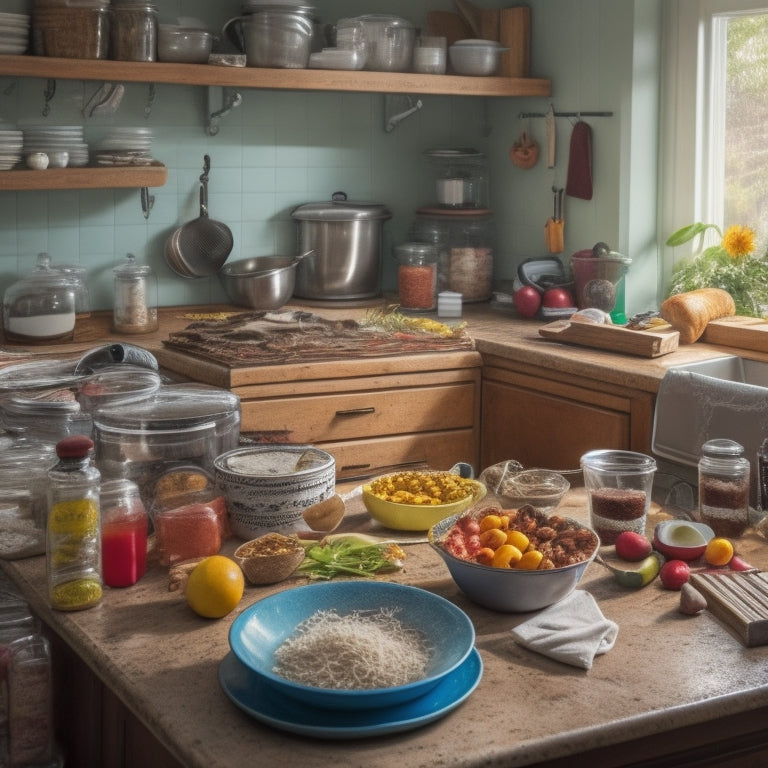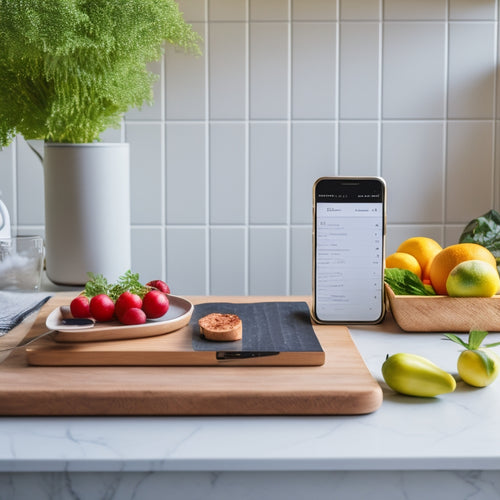
What's Holding You Back From a Clutter-Free Kitchen?
Share
You're struggling to achieve a clutter-free kitchen because you're hanging onto appliances, gadgets, and paperwork that are stealing your counter space. Duplicate items, expired coupons, and unused gadgets are taking up valuable real estate in your drawers. Disorganized meal planning and inefficient workflows are adding to the chaos. And let's be honest, emotional attachments to certain items and lack of decision-making are hindering your ability to purge and declutter. To break free from this cycle, you need to identify the root causes of your clutter and adopt a mindset shift. Now, take the next step towards transforming your kitchen.
Key Takeaways
• Inefficient kitchen workflows, such as searching for utensils or ingredients, hinder productivity and contribute to clutter accumulation.
• Emotional attachments to kitchen items or a lack of decision-making skills can lead to clutter buildup and disorganization.
• Failure to establish routines for sorting and purging unnecessary documents, such as recipe printouts and expired coupons, adds to clutter.
• Inadequate storage spaces, including overcrowded cabinets and disorganized pantries, contribute to kitchen clutter and disorganization.
• A lack of meal planning and mindful grocery shopping leads to food waste, duplicates, and rarely used items taking up valuable kitchen space.
Kitchen Clutter Culprits Exposed
Take a closer look at your kitchen countertops and you'll likely find a plethora of clutter culprits, from countertops overrun with appliances to drawers bursting with gadgets, that are quietly contributing to the chaos.
Kitchen gadget overload is a common issue, with duplicates or rarely used items taking up valuable space. Be honest, how often do you really use that spiralizer or bread maker? It's time to purge what's unnecessary and streamline your kitchen tools.
Paper clutter piles are another major contributor to kitchen disorganization. From recipe printouts to expired coupons, it's easy for paper clutter to accumulate. Designate a specific area for paper storage, such as a file organizer or a designated drawer, and establish a routine for regularly sorting through and purging unnecessary documents.
Meal Planning for Kitchen Organization
By paring down your kitchen tools and tackling paper clutter, you've created a more streamlined space, and now it's time to turn your attention to meal planning, which can help you maintain your new-found organization and reduce kitchen stress. Meal planning is key to keeping your kitchen organized, as it helps you identify what ingredients you need and when, ensuring you only buy what you'll use.
This, in turn, helps with pantry organization, as you'll be more mindful of what you're storing and can avoid clutter buildup.
When you plan your meals, you can create a grocery shopping list that's tailored to your needs, reducing food waste and saving you time and money. You'll also be able to identify areas where you can prep ahead, making cooking easier and faster.
By taking control of meal planning, you'll be able to maintain your kitchen's newfound organization and enjoy a sense of calm and control in the heart of your home.
Overwhelming Kitchen Storage Spaces
Now that you've streamlined your kitchen tools and tackled meal planning, it's time to confront the often-overwhelming kitchen storage spaces that can quickly accumulate clutter.
You're just a few steps away from achieving a clutter-free kitchen, but you need to optimize your storage spaces to maintain your progress.
Start by maximizing your cabinets. Remove everything from your cabinets and sort items into categories. Discard or donate items you no longer need or use. Then, categorize and group similar items together, such as baking supplies or cooking utensils. Assign a home for each group, and use dividers or baskets to keep items organized and easy to access.
Next, focus on organizing your pantry. Purge expired or unused food items, and wipe down shelves before restocking. Use airtight containers to store dry goods, and label each container so you can easily find what you need. Consider installing shelves or a pegboard to maximize vertical storage and keep frequently used items within reach.
Inefficient Kitchen Workflows Revealed
Your kitchen workflow is likely plagued by inefficient habits and patterns that hinder your productivity and contribute to clutter, making it essential to identify and address these issues to achieve a truly clutter-free kitchen.
Take a closer look at your daily routines and identify areas where you can optimize your time management.
Are you spending too much time searching for utensils or ingredients?
Are you constantly wiping down countertops due to messy food prep?
Breaking the Clutter Cycle
Breaking the Clutter Cycle
To break the clutter cycle, you must acknowledge that clutter is a symptom of underlying habits and patterns that need to be changed. It's time to confront the reality that your clutter habits aren't just about the stuff itself, but about the emotional attachment, convenience, or lack of decision-making that leads to accumulation.
To shift your perspective, adopt a declutter mindset that recognizes clutter as a signal for change. This mindset empowers you to identify the root causes of clutter and take deliberate actions to correct them.
Start by tracking your daily habits and identifying areas where clutter tends to accumulate. Ask yourself, 'What triggers my clutter habits?' and 'What benefits do I gain from holding onto these items?'
Frequently Asked Questions
How Do I Declutter Sentimental Kitchen Items, Like Grandma's Cookware?
You're hesitant to declutter sentimental kitchen items, like grandma's cookware, due to emotional attachment. Create a memory box or designated storage for family heirlooms, then organize what's left, keeping only items that serve a practical purpose.
Can a Clutter-Free Kitchen Really Improve My Mental Health?
"As you step into your kitchen, imagine a serene oasis, where every utensil has its place. A clutter-free space reduces stress, boosts mental health, and sparks a sense of control, allowing you to cook up confidence and clarity."
Are There Any Clutter-Reducing Kitchen Gadgets Worth Investing In?
You're searching for game-changing gadgets to optimize your kitchen's real estate; invest in space-saving solutions like collapsible silicone containers and innovative organization tools, such as a magnetic spice strip, to maximize efficiency and minimize clutter.
How Often Should I Deep Clean My Kitchen to Maintain Organization?
Just like a conductor orchestrates harmony, you'll maintain kitchen organization by deep cleaning every 2-3 months, reaping benefits like reduced stress and increased productivity, while implementing storage solutions and tailored cleaning frequencies to guarantee a symphony of tidiness.
Can I Maintain a Clutter-Free Kitchen With a Large Family?
You can maintain a clutter-free kitchen with a large family by implementing strategic storage solutions and organization tips, and delegating tasks to family members through effective time management, ensuring everyone is invested in the process.
Related Posts
-

Simplify Meal Planning With These 5 Essential Apps
You're tired of last-minute takeout and wasted groceries, and you're not alone. Simplify meal planning with these 5 e...
